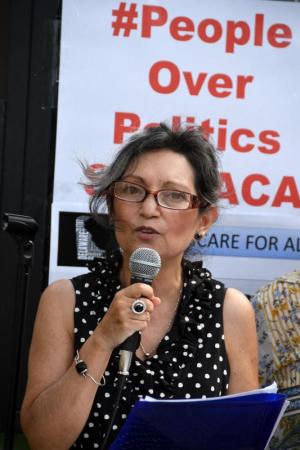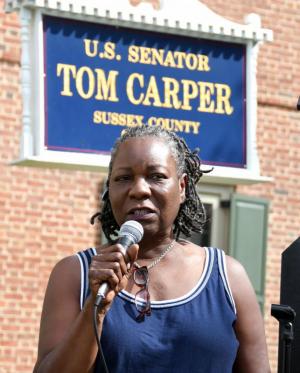Carper seeks bipartisan effort to reform healthcare
To U.S. Sen. Tom Carper, solving the seemingly impossible healthcare impasse in Washington comes down to one thing – bipartisan cooperation.
The Democrat – who is in his third Senate term – told members of the Georgetown Chamber of Commerce at a July 5 meeting what is needed is not a Republican bill or a Democratic bill but an American bill. He said over the past few weeks he's been on a mission contacting Republican senators and governors in an effort to build a coalition.
The fix, he says, is to preserve what works and drop what doesn't work in the Affordable Care Act.
Under President Donald Trump, Republicans have vowed to repeal and replace the act known as Obamacare. The most current Republican bill died for lack of support.
Carper said government officials are in the process of learning what is working in other countries such as Japan where they spend 8 percent of their gross domestic product on healthcare compared to the U.S. expenditure of 18 percent.
He said you don't have to look too far for an example of a healthcare plan that works pretty well. A market-based approach was initiated in 2006 – with several amendments over the years – under the Gov. Mitt Romney administration in Massachusetts.
Carper said in 1993, the Heritage Foundation offered a Republican alternative to a plan proposed by then-First Lady Hillary Clinton with many features that sound familiar, including state exchanges, mandated individual insurance, low-income tax credits, employee mandates, penalties for not signing up and no denial of coverage for pre-existing conditions. “It didn't go anywhere,” Carper said.
He said it might be time to dust that plan off and look at it again.
Carper said one of the downfalls of the Affordable Care Act is the low number of young people in the exchange pools, a problem that was exacerbated by 2014 legislation that prohibits the U.S. Department of Health and Human Services from obtaining tax revenue to make up shortfalls when user fees do not cover all payments to insurance companies. That shortfall is around $2.5 billion nationwide.
In some cases, younger, healthier people with few claims are opting to pay the penalty and not enroll, making the exchanges top-heavy with older people who have many claims causing a lopsided pool of people for insurance companies in the exchanges. Carper said a higher penalty would force more people to enroll.
Last year, many insurance companies left the state exchanges and rates have soared. “Some lost their shirts,” Carper said.
In Delaware, Aetna has already announced it will leave the state exchange at the end of 2017, leaving Highmark Blue Cross Blue Shield of Delaware as the only company offering coverage.
Even with the infighting going on, Carper is optimistic. “We can get out of this, and maybe we can work together,” Carper said.
Carper is in his 40th year of public service to Delaware: state treasurer, 1977 to 1983; U.S. House; 1983 to 1993;; governor, 1993 to 2001; and U.S. Senate, 2001 to present.
Carper hosts roundtable at CHEER
Carper finished his July 4 break from Washington, D.C., with a roundtable discussion July 10 at the CHEER Community Center in Georgetown. Immediately following the hour-long meeting, Carper made the 110-mile drive back to the nation’s capital.
For the most part, Carper listened and questioned more than dozen people, representing a wide swath of groups who face healthcare reform.
Don Keister from atTAcK addiction, a nonprofit that educates and raises awareness on addiction, said there’s a stigma associated with addiction, which often results in people not getting treated. Keister started the organization with his wife Jeanne in 2012 after their son Tyler died from an accidental overdose.
Keister said funding is critical to helping with the opioid crisis in Delaware and across the nation. Republicans and Democrats have to come together, he said.
Jennifer Smolowitz, Mental Health Association in Delaware project director for suicide prevention, said she gets calls every day for their resources. She said the fastest-growing segment of the population committing suicide is white males older than 84 years.
“That’s always surprising to people,” said Smolowitz.
The association’s resources are already being stretched with current funding, she said. Reductions in mental health services would be devastating, she said.
Ken Bock, CHEER executive director, thanked the senator for his appearance and was short with his comments. He said many of his clients are opposed to being institutionalized, which would happen with cuts to Medicaid.
Marley Ford, representing the Delaware Chapter of the Leukemia & Lymphoma Society, said blood cancer is nondiscriminatory, and patients should not go broke over something that picked them.
This disease is not preventable, and there needs to be access and a continuum of care, Ford said.
What is the Affordable Care Act?
The intent of the Affordable Care Act is to expand health insurance coverage to all Americans. The act's goals are to improve the quality of coverage; expand Medicaid coverage; create a health insurance marketplace where individuals and businesses can shop for private coverage; prohibit insurance companies from denying, canceling, or charging more for insurance policies because a person is sick or has a pre-existing health condition; and strengthen Medicare.
In the U.S. with 300 million people:
47 percent have insurance at work
23 percent have Medicaid
17 percent have Medicare
4 percent are in exchanges
9 percent are uninsured



























































